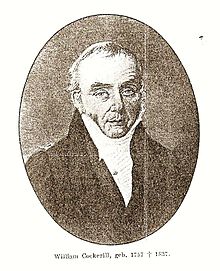William Cockerill
| William Cockerill | |
|---|---|
 |
|
| Born | 1759 Lancashire, England |
| Died | 1832 Aachen, Prussia |
| Citizenship | British after 1810 French (Belgian) |
| Occupation | Inventor, machine maker, industrialist |
William Cockerill (1759–1832) was a British entrepreneur who created a textile machine manufacturing business in Verviers and Liège, Belgium (then part of the French First Republic).
He was instrumental in founding the industrial spinning industry in continental Europe.
William Cockerill was born in Haslingden, Lancashire, England in 1759. He began his working career as a blacksmith in England, and was said to be exceptionally skilled as a mechanical engineer although he met little success in England.
In 1794 he travelled to St. Petersburg, Russia having been recommended for his skill to Catherine II. Later after the Empresses' death Paul I of Russia sent him to prison for failing to construct a prototype on time. He escaped to Sweden, where he was employed as an engineer, constructing locks on a canal. Civil engineering did not suit him, and, having heard of the woollen industry in Liège and Verviers he decided that he could be successful as a machine maker there. First he travelled to Hamburg, and since machine design was a closely guarded industry from which England profited he proposed to the British envoy there, a Mr. Crawford, to return to England and not aid a foreign country if he was given a pension on his return. Though the envoy approved and forwarded his intentions, he had heard nothing after six months and so went to the Low Countries, first to Amsterdam, then to the province of Liège.
In 1799, he began manufacturing machines for the spinning and carding of wool in Verviers for the cloth manufacturers Iwan Simonis and his sister Marie Anne Simonis (who ran her husband Jean-François Biolley's manufactory). He then brought his family from England and settled in Belgium. He was joined in 1802 by James Holden, first as his assistant, who later set up his own business.
In 1807 he moved to the city of Liège and set up a machine building factory there with his three sons. In 1807 he was awarded the Legion of Honor by Napoleon for his services to manufacturing, in 1810 he became a Belgian citizen, and in 1813 he imported a Watt steam engine.
...
Wikipedia
